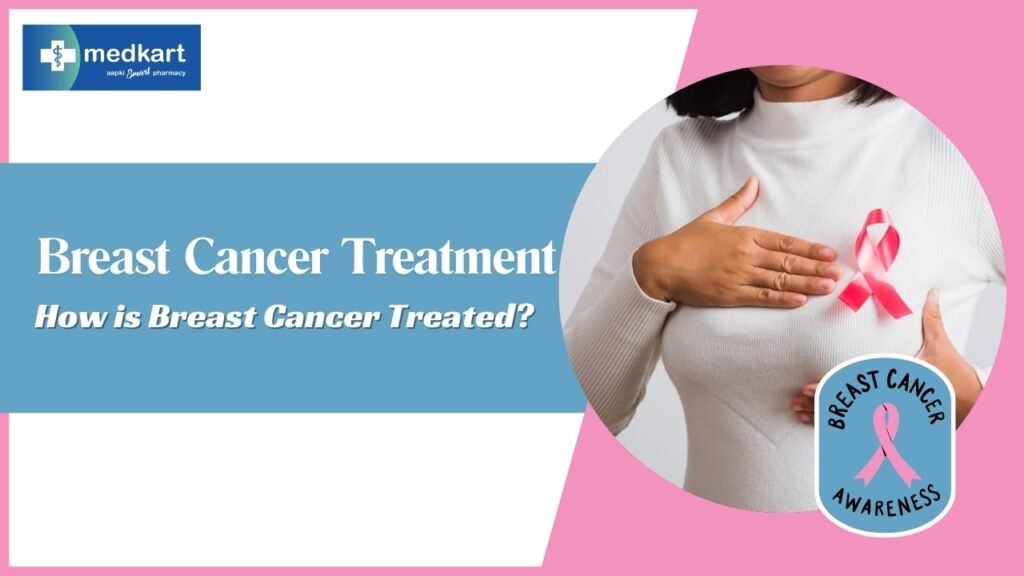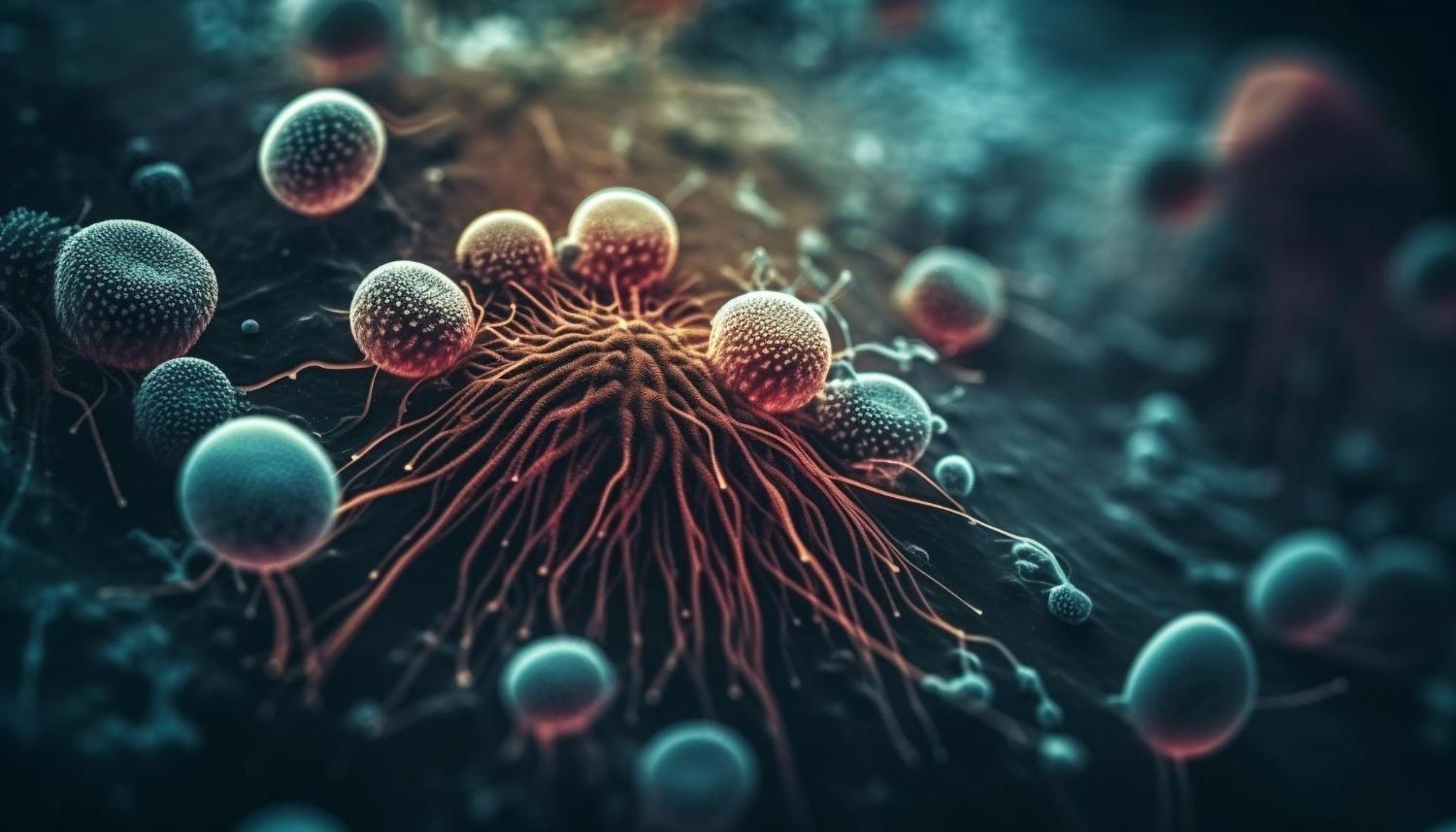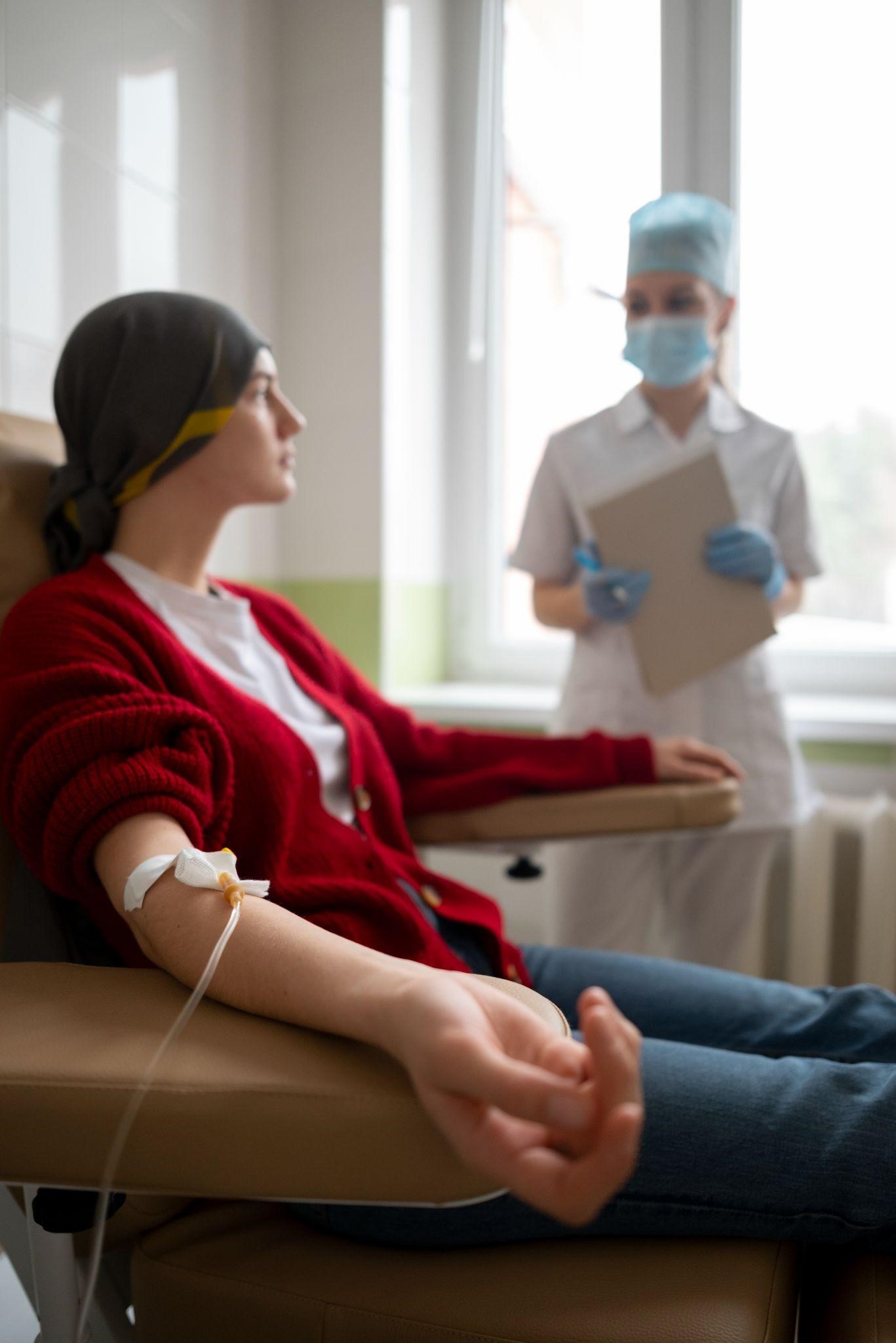Last updated on April 12th, 2025 at 03:35 pm
 Breast cancer treatment encompasses a range of therapies tailored to each patient’s specific circumstances. It often includes a combination of surgery to remove the tumour, radiation therapy to target any remaining cancer cells, and systemic treatments such as chemotherapy, hormonal therapy, targeted therapy, or immunotherapy.
Breast cancer treatment encompasses a range of therapies tailored to each patient’s specific circumstances. It often includes a combination of surgery to remove the tumour, radiation therapy to target any remaining cancer cells, and systemic treatments such as chemotherapy, hormonal therapy, targeted therapy, or immunotherapy.
The goal of treatment is to eliminate cancer cells, prevent recurrence, and improve overall survival rates while also considering the patient’s quality of life and individual preferences. Advances in research and technology continue to expand treatment options and improve outcomes for individuals diagnosed with breast cancer.
Treatment For Breast Cancer
The best breast cancer treatment are mentioned below:
Early Detection
One of the most critical aspects of treatment is early detection. Regular screenings, including mammograms and clinical breast exams, can help catch cancer in its early stages when it’s most treatable. Advances in imaging technology, such as 3D mammography and magnetic resonance imaging (MRI), have improved the accuracy of detecting breast abnormalities, allowing for prompt intervention.
Surgery
For many patients, a lumpectomy or mastectomy may be recommended to remove the cancerous tissue. However, advancements in surgical techniques have led to more precise and minimally invasive procedures, resulting in faster recovery times and reduced post-operative complications.
Techniques like oncoplastic surgery combine oncologic principles with plastic surgery techniques to achieve optimal cosmetic outcomes without compromising cancer control.

Targeted Therapies
One of the most significant breakthroughs in breast cancer treatment has been the development of targeted therapies. These treatments specifically target cancer cells while sparing healthy tissue, leading to fewer side effects compared to traditional chemotherapy.
Targeted therapies may include:
- Hormone Therapy: Hormone receptor-positive breast cancers, which rely on estrogen or progesterone to grow, can be treated with hormone-blocking medications like tamoxifen, aromatase inhibitors, or selective estrogen receptor modulators (SERMs). These drugs help prevent the hormones from fueling cancer growth.
- HER2-Targeted Therapy: Approximately 20% of breast cancers overexpress the human epidermal growth factor receptor 2 (HER2), making them more aggressive. HER2-targeted therapies, such as trastuzumab (Herceptin) and pertuzumab (Perjeta), interfere with the HER2 protein to slow down cancer growth and improve outcomes.
- CDK4/6 Inhibitors: Cyclin-dependent kinase 4/6 (CDK4/6) inhibitors, such as palbociclib, ribociclib, and abemaciclib, have revolutionized the treatment of hormone receptor-positive, HER2-negative metastatic breast cancer. These drugs work by blocking proteins involved in cancer cell division, leading to tumor shrinkage and prolonged progression-free survival.
Immunotherapy
Immunotherapy, which harnesses the body’s immune system to target and destroy cancer cells, has emerged as a promising avenue in treatment. Drugs like pembrolizumab and atezolizumab, which target immune checkpoints like PD-1 and PD-L1, have shown efficacy in treating triple-negative breast cancer, a subtype known for its aggressive behavior.
Precision Medicine
Advancements in genomic sequencing technologies have paved the way for precision medicine in treatment. By analyzing the genetic makeup of a tumor, doctors can identify specific mutations or biomarkers that drive cancer growth.
This enables tailored treatment approaches, such as matching patients with targeted therapies or clinical trials based on their unique molecular profiles.

Breast Cancer Treatment By Stage
Breast cancer treatment varies depending on the stage of the disease. Here’s a brief overview of treatment options by stage:
- Stage 0: Treatment often involves surgery to remove the abnormal cells or a small area of cancerous tissue. Sometimes, radiation therapy or hormonal therapy may also be recommended.
- Stage I and II: Treatment typically involves surgery to remove the tumor, followed by radiation therapy to kill any remaining cancer cells. Chemotherapy, hormonal therapy, or targeted therapy may also be recommended depending on the specific characteristics of the tumor.
- Stage III: Treatment usually involves a combination of surgery, chemotherapy, and radiation therapy. Hormonal therapy or targeted therapy may also be used depending on the tumor’s hormone receptor status.
- Stage IV: Treatment focuses on managing the cancer and controlling symptoms. Options may include chemotherapy, hormonal therapy, targeted therapy, and immunotherapy. Palliative care may also be provided to improve quality of life.
In all stages, treatment plans are personalized based on factors such as the tumor’s size, location, hormone receptor status, and the patient’s overall health and preferences.
> Consult a Doctor and Medkart will help you Order Medicines Online
Conclusion:
The landscape of breast cancer treatment is continually evolving, driven by ongoing research and innovation. From early detection strategies to targeted therapies and precision medicine approaches, patients today have more options and better outcomes than ever before.
While challenges remain, the progress made in treatment offers hope for a future where this disease can be effectively controlled and, ultimately, cured.
Read: What are Generic Medicines?
FAQs on Breast Cancer Treatment
Q1. What is breast cancer treatment?
Breast cancer treatment typically involves a combination of surgery, radiation therapy, chemotherapy, hormonal therapy, targeted therapy, or immunotherapy. The specific treatment plan depends on factors such as the stage of the cancer, tumor characteristics, and the patient’s overall health and preferences. Treatment aims to remove or destroy cancer cells, prevent recurrence, and improve survival and quality of life.
Q2. What is the main treatment for early-stage breast cancer?
The main treatment for early-stage breast cancer often involves surgery, such as a lumpectomy or mastectomy, followed by radiation therapy to kill any remaining cancer cells.
Q3. Is chemotherapy always necessary for breast cancer treatment?
Chemotherapy may not always be necessary for breast cancer treatment, especially for early-stage, hormone receptor-positive tumors. However, it may be recommended for larger tumors, aggressive cancers, or those that have spread to the lymph nodes.
Related Links:
- PCV in Blood Test
- Normal Hemoglobin Level in Female
- How to use Menstrual Cups?
- How to Remove Gas from Stomach Instantly?
- How to Reduce Period Pain?
- How to increase Testosterone Level?
- How to Increase Sex Stamina?
- How to eat Chia seeds?
- How to check Pregnancy at Home?
- Home Remedies for Stomach Pain
- Danger Level of SGPT and SGOT

